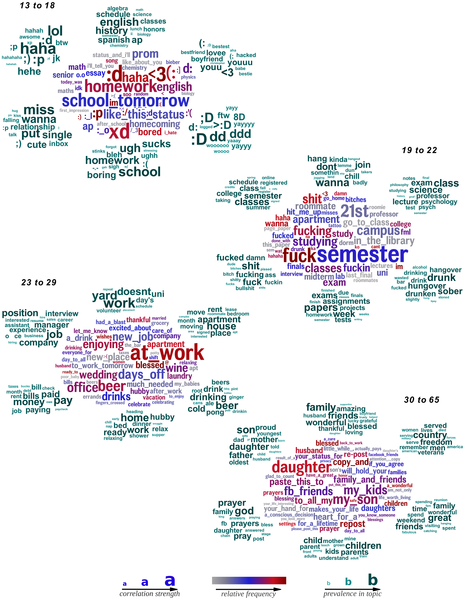Language Analysis Of Facebook Offers New Insights Into Human Personality

The emergence of social media has helped researchers predict patterns in epidemiology, high finance, and other realms. Now, analysis of massive amounts of data from scores of thousands of volunteers is yielding insight into modern human language — with striking variations in speech with respect to personality, gender, and age.
Researchers from Cambridge University and the University of Pennsylvania gleaned new insight from analyzing more than 700 million words, phrases, and topic categories from the Facebook messages of 75,000 volunteers, who also took standard personality tests. “The data itself drives a comprehensive exploration of language that distinguishes people, finding connections that are not captured with traditional closed-vocabulary word-category analyses,” the researchers wrote, referring to pre-set lists of words customarily used in such study.
The analysis represents the largest investigation thus far into language and personality. The English-speaking research team reported new insights into psychosocial processes yielding predictable results, such as a higher frequency of reference to “mountains” among people living in higher elevations, as well as a higher usage of words and phrases such as “sick of” and “depressed” among neurotic people. The analysis also suggested new hypotheses to explore, such as the idea that an active life implies emotional stability. They also found that men tend to express more possession over their wives and girlfriends, using the word “my” more often than women in reference to romantic partners.
Real-time differences among demographic populations appeared, such as school-related chatter among teenagers, with the word “ugh” correlating highly with “homework.” Likewise, the topic “drunk” correlated with words such as “wasted” or “hungover” among young adults ages 19-22, but was more reserved among people ages 23-29.
Previously, researchers used a standard approach of analyzing fixed words and phrases when attempting to correlate language use with personality. By contrast, the researchers here exacted the collection of words, phrases, and topics from the very data used to analyze personality — taking a real-time look at real language employed by scores of thousands of online users.
The team employed a form of open-vocabulary analysis they call “differential language analysis” to discern patterns in language across millions of Facebook messages. Using a form of traditional language analysis by applying the Linguistic Inquiry and Word Count, a tool used in the field of psychology, the researchers demonstrated that their analysis can provide insights from online language into personality and behavior.
“Online social media such as Facebook are a particularly promising resource for the study of people, as ‘status’ updates are self-descriptive, personal, and have emotional content,” the researchers write. “Language use is objective and quantifiable as behavioral data and, unlike surveys and questionnaires, Facebook language allows researchers to observe individuals as they freely present themselves in their own words.”
As the world’s most popular and pervasive social media platform, Facebook provides scientists with a window into the social and psychological details of the spirited human animal. Yet, the study suffers the same flaws as most others in the social sciences, the researchers acknowledge — namely, that people make stuff up.
“This work is still subject to sampling and social desirability biases. Language connections with psychosocial variables are often dependent on context,” they wrote. “Here, we examined language in a large sample of the broad context of Facebook. Under different contexts, it is likely some results would differ.”
The researchers noted that word using fixed lists or words and phrases has yielded great insight into human personality and behavior, but that greater knowledge of the human spirit would come with increased use of real-time language analysis in the future.

Source: Source: Schwartz, H.A., Eichstaedt, J.C., Kern, M.L., Dziurzynski, L., Ramones, S.M., et al. Personality, Gender, And Age In The Language Of Social Media: The Open-Vocabulary Approach.” PLoS ONE. 2013.



























